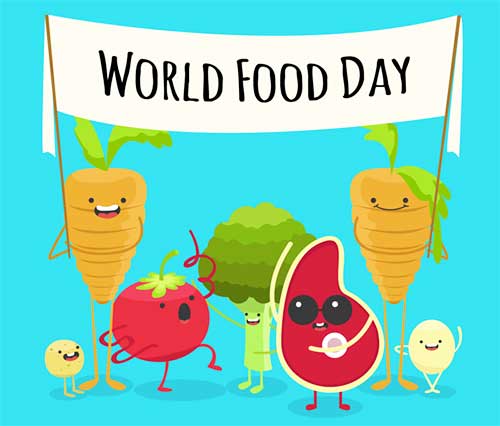
Introduction to World Food Day
World Food Day is observed every year on October 16 to raise awareness about global hunger and promote action to ensure food security for all. This day, organized by the Food and Agriculture Organization (FAO) of the United Nations, unites governments, organizations, and individuals worldwide to address the growing challenge of hunger. With over 820 million people facing hunger globally, World Food Day serves as a reminder that access to nutritious food is a fundamental human right. It also encourages us to build a more sustainable and resilient food system.
The History of World Food Day
World Food Day was first celebrated in 1981, marking the founding of the Food and Agriculture Organization (FAO) in 1945. The goal was to draw attention to global hunger issues and advocate for collective action to eradicate hunger, malnutrition, and poverty.
The Founding of the Food and Agriculture Organization (FAO)
The FAO was established in 1945 as part of the United Nations' efforts to address post-World War II food shortages. Its mission is to eliminate hunger, ensure food security, and promote sustainable agricultural practices worldwide.
Why October 16 is Celebrated
October 16 was chosen to commemorate the founding of the FAO, and it has since become an annual event celebrated in more than 150 countries. The day focuses on building awareness about food security, sustainable development, and the urgent need to combat hunger.
World Food Day 2024 Theme
Each year, World Food Day is marked by a specific theme highlighting an essential aspect of food security. These themes draw attention to pressing global issues and encourage action from governments, organizations, and individuals.
Significance of the Annual Theme
Though not yet officially announced, the 2024 theme is expected to focus on creating sustainable and resilient food systems to cope with the growing challenges posed by climate change, economic instability, and population growth.
Focus on Sustainable Food Systems
In recent years, there has been increasing emphasis on building sustainable food systems that provide food security and protect the environment. This includes promoting sustainable farming practices, reducing food waste, and raising awareness about the link between food security and climate action.
Global Hunger Crisis
World hunger remains one of the most significant challenges facing humanity. Despite progress in some areas, millions still go to bed hungry daily.
Statistics on World Hunger
According to recent estimates by the FAO, around 820 million people suffer from chronic hunger, with millions more at risk due to food insecurity. Sub-Saharan Africa, South Asia, and parts of Latin America are among the regions hardest hit by hunger.
Fundamental Causes of Food Insecurity
Several factors contribute to global food insecurity, including poverty, political conflict, economic instability, and the growing impact of climate change. Disruptions in food supply chains due to natural disasters, war, and pandemics exacerbate the problem, making access to food even more challenging for vulnerable populations.
The Importance of World Food Day
World Food Day is critical for raising awareness about the ongoing hunger crisis and motivating individuals and organizations to act. The event underscores the urgency of working together to achieve Zero Hunger, one of the United Nations' Sustainable Development Goals (SDGs).
Raising Awareness About Hunger
World Food Day educates the public about the severity of global hunger, its root causes, and the need for systemic change to address food insecurity.
Encouraging Action and Global Cooperation
The day is about raising awareness and encouraging governments, NGOs, and individuals to take concrete steps toward ending hunger. This includes supporting local food systems, reducing food waste, and promoting sustainable agricultural practices.
The Role of the Food and Agriculture Organization (FAO)
The FAO coordinates global efforts to eliminate hunger, improve agricultural productivity, and promote sustainable food systems.
Overview of the FAO's Mission
The FAO's mission is to create a world where everyone has regular access to enough nutritious food to lead active and healthy lives. It works with governments and partners to develop policies, projects, and programs that tackle the root causes of hunger and food insecurity.
FAO's Global Programs for Hunger Relief
Through initiatives like the "Save Food" campaign and the "Family Farming Decade," the FAO advocates for sustainable agricultural practices, better food distribution systems, and stronger safety nets for vulnerable populations.
How World Food Day Is Celebrated
World Food Day is observed with events, campaigns, and initiatives at both local and global levels. It brings together people from different sectors to discuss solutions to hunger and share success stories of food security projects.
Local and Global Events
In many countries, governments and organizations host conferences, workshops, and educational programs to highlight food security issues. Community events like food drives, local market fairs, and farm tours are also organized to encourage public participation.
Social Media Campaigns and Public Engagement
Social media platforms are crucial in spreading awareness about World Food Day. Hashtags like #WorldFoodDay and #ZeroHunger engage a global audience, encouraging individuals to participate in discussions and share their efforts to tackle hunger.
World Food Day Initiatives
World Food Day is often marked by various initiatives that aim to combat hunger and promote food security.
Food Drives and Charity Events
Many organizations and communities hold food drives to collect and distribute food to needy people. These initiatives help raise awareness about local food insecurity while directly assisting vulnerable populations.
Education and Awareness Campaigns
Schools, universities, and NGOs often participate in awareness campaigns, highlighting the importance of sustainable food production and the need to reduce food waste.
The Connection Between Food Security and Climate Change
Climate change is one of the most significant threats to global food security. Extreme weather events, rising temperatures, and changing precipitation patterns impact agriculture worldwide.
Impact of Climate Change on Agriculture
Climate change can lead to crop failure, soil degradation, and reduced water availability, threatening farmers' livelihoods and the food supply for millions. The FAO has been promoting climate-resilient farming practices to mitigate these impacts.
Promoting Sustainable Farming Practices
Adoption of sustainable farming practices is essential to ensuring long-term food security. These include using water-efficient irrigation systems, planting climate-resistant crops, and encouraging organic farming methods that protect the environment.
The Role of Governments and NGOs in Food Security
Governments and NGOs are crucial players in the fight against hunger and food insecurity.
Government Policies for Food Security
Governments can support food security by implementing policies that promote sustainable agriculture, provide subsidies to small farmers, and ensure that food is affordable and accessible to all citizens.
Non-Governmental Organizations (NGOs) Contributions
NGOs such as the World Food Programme (WFP) and Action Against Hunger work on the ground to provide emergency food assistance, promote sustainable farming practices, and empower communities to become self-sufficient.
Innovative Solutions to Combat Hunger
Innovation plays a crucial role in addressing the global hunger crisis.
Technology in Agriculture
Technological advancements, such as precision farming, drones, and AI-based agricultural tools, are helping farmers increase yields, reduce resource use, and improve crop resilience to climate change.
Food Waste Reduction
Around one-third of the food produced globally is wasted. Reducing food waste through better storage, improved distribution, and consumer awareness campaigns can significantly contribute to ending hunger.
Empowering Farmers and Local Communities
Smallholder farmers are crucial in feeding the world, especially in developing regions.
Supporting Smallholder Farmers
Financial support, market access, and education for smallholder farmers can boost agricultural productivity and reduce food insecurity in rural areas.
Importance of Local Food Systems
Strengthening local food systems is essential for building resilience against global disruptions. Food security can be enhanced at the grassroots level by supporting local farmers and promoting community-based agricultural practices.
The Role of Youth in World Food Day
Youth engagement is crucial in building a sustainable future for food security.
Involving Youth in Food Security Initiatives
World Food Day encourages young people to take an active role in food security initiatives, whether through volunteer work, entrepreneurship in agriculture, or advocacy for sustainable farming practices.
Youth-Led Movements for Sustainable Agriculture
Youth-led organizations and initiatives are becoming a powerful force in driving change, especially in promoting sustainable agricultural practices and raising awareness about the importance of food security.
Success Stories in Combating Hunger
World Food Day also celebrates the successes of initiatives that have significantly impacted the fight against hunger.
Examples of Successful Programs and Projects
There are many examples of successful efforts to combat hunger, from community-led agricultural projects in Africa to large-scale initiatives like the World Food Programme's school feeding programs.
How Individuals Can Contribute
Individuals play an essential role in addressing food insecurity and promoting sustainable practices.
Donate to Hunger Relief Organizations
Donating to organizations focusing on hunger relief, such as the FAO, WFP, or local food banks, can help provide immediate assistance to those in need.
Reduce Personal Food Waste
Reducing personal food waste by planning meals, using leftovers, and supporting food rescue programs can also make a meaningful impact in the fight against hunger.
Conclusion
World Food Day is a vital reminder that the fight against hunger is far from over. By raising awareness, promoting sustainable practices, and fostering global cooperation, World Food Day encourages everyone—governments, organizations, and individuals—to take action. Together, we can work toward a world where hunger is eradicated and food security is guaranteed.
FAQs
• What is the purpose of World Food Day?
World Food Day aims to raise awareness about global hunger and promote action to ensure food security and sustainable agricultural practices.
• When is World Food Day celebrated?
World Food Day is celebrated annually on October 16.
• What is the theme of World Food Day 2024?
Although the 2024 theme has not been announced yet, it is expected to focus on building sustainable and resilient food systems.
• How can I contribute to World Food Day?
You can contribute by donating to hunger relief organizations, reducing food waste, and participating in local food drives or awareness campaigns.
• What is the role of the FAO on World Food Day?
The FAO coordinates global efforts to combat hunger, promote food security, and advocate for sustainable agricultural practices.
#WorldFoodDay #FoodSecurity #GlobalHunger



